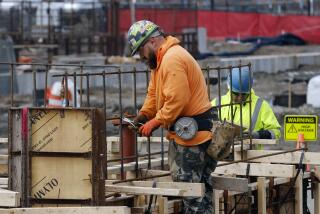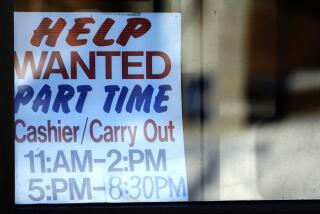Builders Are Bubbly, Manufacturers Gloomy
- Share via
NEW YORK — Manufacturing executives predict a modest slowdown in orders and hiring over the next three months, partly due to Asia’s ongoing economic troubles, according to a Dun & Bradstreet Corp. survey released Thursday.
The findings differ from a separate Dun & Bradstreet survey of construction executives, who believe employment levels will improve significantly in the coming months.
The Murray Hill, N.J.-based financial information company found in its July survey of 1,000 U.S. manufacturing executives that their expectations have decreased since a similar survey conducted in June.
“Despite robust consumer spending on products and goods, it appears that manufacturers expect Asia’s trade ripple effects will weaken order books, mute production and significantly drive down hiring,” said Joseph Duncan, Dun & Bradstreet’s chief economic advisor.
Expectations may have been skewed by the recently ended strikes at General Motors Corp., which temporarily idled 200,000 workers and cost the No. 1 U.S. auto maker an estimated $2 billion, Duncan said.
Construction executives believe, however, that low interest rates and increased government spending on federal work projects will cause an increase in hiring through October.
In its July survey of 200 U.S. construction chiefs, Dun & Bradstreet found they expect the number of new orders will remain steady over the next three months, with prices dropping somewhat.
Rising home prices are not expected to offset a boom in residential construction, Duncan said.
“Commercial construction, moreover, continues to expand, with a healthy rate of spending on new factories, warehouses and public projects such as schools, prisons and sewer systems,” he said.
In a separate report issued Thursday, the Labor Department said the number of first-time claims for unemployment benefits last week fell by 2,000 to a seasonally adjusted 301,000. That’s well below the 394,000 reached during two consecutive weeks in late June and early July, during the GM strikes.
A four-week moving average of claims fell to 303,000, down from 307,000 for the period ended one week earlier. It was the lowest level in a year.






